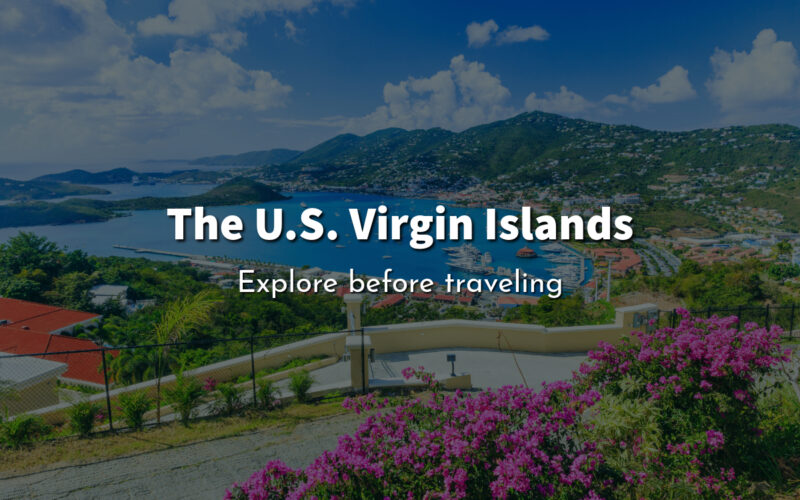Things to know before visiting The U.S. Virgin Islands

The United States Virgin Islands (USVI) are popular destinations for travelers, particularly those seeking beautiful beaches, clear Caribbean waters, and a blend of rich cultural history with modern amenities.
Why travelers love to visit the US Virgin Islands:
- Natural Beauty: Pristine beaches, lush landscapes, and vibrant coral reefs attract nature lovers and outdoor enthusiasts.
- History and Culture: Each island has its own unique history, reflected in architecture, cuisine, and local traditions.
- Water Activities: Snorkeling, diving, sailing, and boating opportunities abound in the warm Caribbean waters.
- Accessibility: Being a U.S. territory means easy access for U.S. citizens without needing a passport, and English is widely spoken.
4 Main Islands
1. St. Thomas:
- Charlotte Amalie: The capital and largest city of the USVI, known for its historic sites, shopping, and vibrant nightlife.
- Magens Bay: A famous beach known for its calm waters and beautiful scenery.
- Coral World Ocean Park: Offers opportunities for snorkeling and marine life encounters.
2. St. John:
- Virgin Islands National Park: Covers over half of the island and is renowned for its pristine beaches, hiking trails, and rich biodiversity.
- Trunk Bay: Often cited as one of the most beautiful beaches in the world, known for its crystal-clear waters and underwater snorkeling trail.
3. St. Croix:
- Christiansted and Frederiksted: Two main towns offering historical architecture, shopping, dining, and cultural experiences.
- Buck Island Reef National Monument: A protected area with amazing coral reefs and underwater trails for snorkeling.
4. Water Island:
- The smallest of the USVI, known for its quiet and secluded beaches, such as Honeymoon Beach.
Climate
- Tropical Climate: Warm temperatures year-round, with an average range between 77°F (25°C) in the winter and 82°F (28°C) in the summer.
- Rainy Season: Typically from May to November, with a higher chance of hurricanes between June and November.
Activities
- Beaches: Pristine beaches with white sand and turquoise waters, perfect for swimming, sunbathing, and beachcombing.
- Snorkeling and Diving: Rich marine life and coral reefs, with notable spots like Buck Island and Trunk Bay’s underwater snorkeling trail.
- Water Sports: Sailing, kayaking, windsurfing, and paddle boarding are popular.
- Hiking: Numerous trails in the Virgin Islands National Park offer scenic views and opportunities to see native wildlife.
- Historical Tours: Explore colonial-era forts, sugar plantations, and museums that showcase the islands’ history and culture.
Culture
- Blend of Influences: The culture is a mix of African, European, and Caribbean influences, reflected in the islands’ music, dance, food, and festivals.
- Cuisine: Features a mix of Caribbean flavors with dishes like conch fritters, roti, johnnycakes, and fresh seafood.
- Festivals: Events like Carnival on St. Thomas and St. John, and the Crucian Christmas Festival on St. Croix, celebrate local traditions with parades, music, and dance.
Practical Information
- Local Currency: U.S. Dollar (USD). ATMs are widely available, but it’s good to carry some cash for small purchases and places that may not accept cards.
- Language: English
- Transportation: Cars are the main mode of transport, and driving is on the left side of the road. Ferries and boats are commonly used to travel between the islands.
- Travel Documents: U.S. citizens do not need a passport to travel to the US Virgin Islands but should carry a government-issued photo ID and proof of citizenship (such as a birth certificate or passport card). Non-U.S. citizens may require a passport and visa.
- Health Insurance and Medical Needs: It’s recommended to have travel insurance that covers medical expenses, as healthcare costs can be high on the islands. Bring any necessary medications and a copy of prescriptions.
- Budget Planning: Plan your budget considering costs for flights, accommodation, meals, transportation, and activities. Prices can vary, so research and book in advance when possible.
- Clothing and Gear: Pack appropriate clothing for a tropical climate, including swimwear, light clothing, sunscreen, hats, and sunglasses. Water shoes or sandals suitable for beaches are also recommended.
Accommodations
- Variety of Options: From luxury resorts and boutique hotels to vacation rentals and eco-friendly lodges, there are accommodations to suit all budgets and preferences.
- Reservations: Make reservations for accommodations and popular activities ahead of time, especially during peak seasons, to ensure availability and potentially lower costs.
Cost Factors
- Flights: Flights to the US Virgin Islands can vary in price depending on your departure location, time of booking, and season. Generally, flights from the continental United States can range from a few hundred to over a thousand dollars round-trip per person.
- Accommodation: Accommodation options range from luxury resorts to budget-friendly hotels, guesthouses, and vacation rentals. Prices can vary significantly based on location, amenities, and season. Expect to pay more during peak tourist seasons.
- Food and Dining: Dining out in the USVI can range from inexpensive local eateries to high-end restaurants. Prices for meals can be comparable to mainland U.S. cities, with local cuisine and seafood often being highlights.
- Transportation: Renting a car or using taxis can add to your expenses. Rental cars can range from $50 to $100+ per day, depending on the type of vehicle and insurance coverage.
- Activities: Costs for activities like boat tours, snorkeling trips, island tours, and entrance fees to attractions vary. Some beaches and natural attractions are free or have minimal fees, while guided tours and special experiences can be more expensive.
Travel Tips
- Best Time to Visit: December to April is the peak tourist season with the most pleasant weather.
- Off-Peak Travel: Consider visiting during shoulder seasons (spring or fall) to potentially find better deals on accommodations and flights.
- Local Culture: Respect local customs and traditions, including modest attire when visiting churches or local communities.
- Safety: The USVI is generally safe for tourists, but exercise normal precautions regarding personal belongings and safety, especially in crowded tourist areas.
- Hurricane Preparedness: If visiting during the hurricane season, be aware of weather forecasts and have a plan in place.
The hurricane season
The hurricane season for the U.S. Virgin Islands typically runs from May 15 to November 30, with the peak of the season occurring between mid-August and late October. During this time, the islands are at a higher risk of experiencing tropical storms and hurricanes.
Here are some key points about the hurricane season in the USVI:
1. Peak Season
- Mid-August to Late October: This period sees the highest likelihood of hurricanes and tropical storms due to warmer sea temperatures and favorable atmospheric conditions.
2. Weather Patterns
- Increased Rainfall: The rainy season coincides with the hurricane season, bringing more frequent and heavier rain showers.
- Storm Systems: Tropical depressions, tropical storms, and hurricanes can develop, bringing strong winds, heavy rain, and potential flooding.
3. Preparation and Safety
- Monitoring: It’s essential to keep an eye on weather forecasts and updates from the National Hurricane Center and local authorities.
- Evacuation Plans: Familiarize yourself with evacuation routes and shelters in case of severe weather.
- Travel Insurance: Consider purchasing travel insurance that covers trip cancellations or interruptions due to hurricanes.
4. Traveling During Hurricane Season
- Pros: Fewer tourists, lower prices on accommodations and flights, and a more tranquil experience.
- Cons: Risk of disrupted travel plans, potential for severe weather, and some attractions or services may be closed or limited.
Despite the risks, many travelers still visit the USVI during hurricane season and enjoy their trip without encountering major storms. However, it’s crucial to stay informed and be prepared for changing weather conditions.








